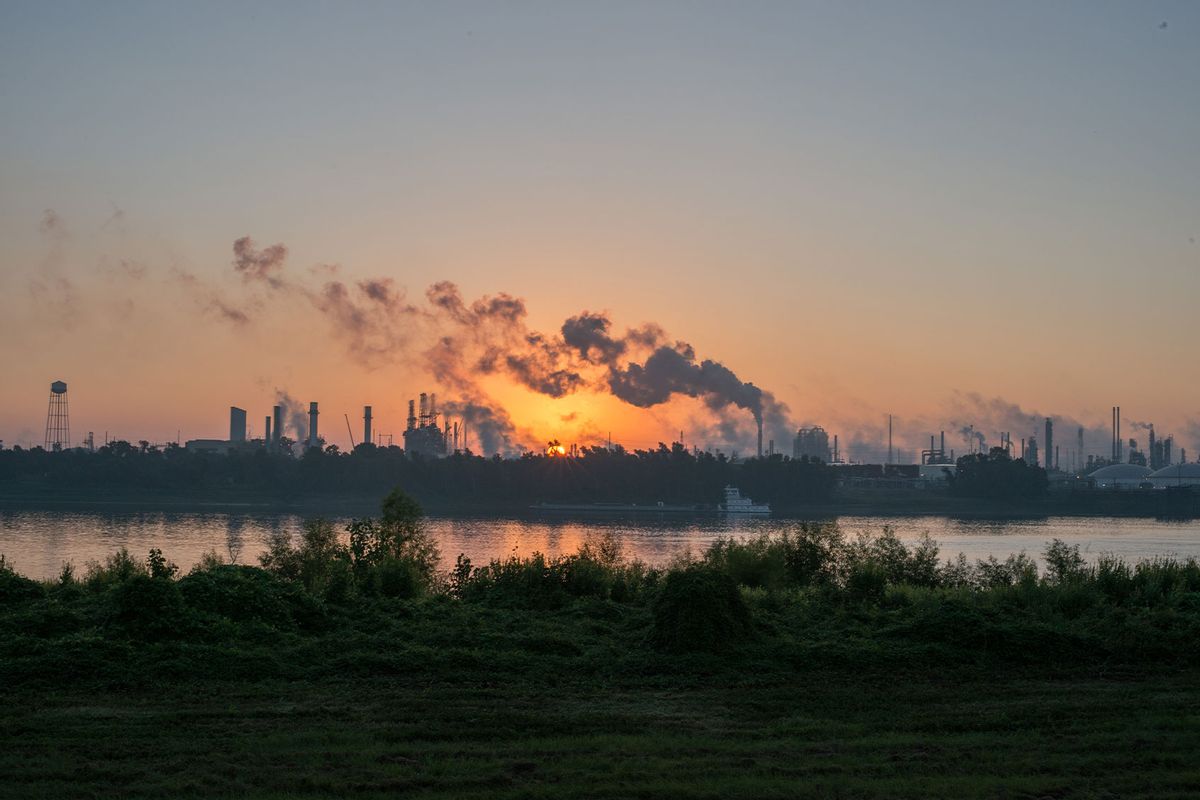While many approach the subject of fossil fuels through the lens of finance, science and politics, Roishetta Ozane, a Black single mother with six children, spoke with restrained emotion when discussing the extraction of liquid natural gas (LNG). Ozane has a much more personal and painful connection to the multi-billion dollar industry.
"From an ethical standpoint, banks and investment firms should no longer be financing new fossil fuel infrastructure."
"I gave birth to seven children, but one of my children was born into heaven because I had him prematurely and he did not survive," Ozane said. Two of her other children have asthma, and she believes that is also a factor. "I know that the premature births is linked to the industrial pollution that we're bringing in every day in our community."
In the face of her tragedy, Ozane became the founder, director and CEO of the Vessel Project of Louisiana, a small mutual aid and environmental justice organization. Most recently, she contributed to a new report by the grassroots environmental group Stand.Earth that details how four LNG facilities are linked to $1.6 billion in Citibank funding and allegedly caused "over $36 million in health costs, two deaths, and more than 1,600 incidences of asthma symptoms per year" in both Louisiana and Texas. The bank’s financed emissions related to these facilities is equivalent to over 6 coal plants or 6 million gasoline cars annually.
"From an ethical standpoint, banks and investment firms should no longer be financing new fossil fuel infrastructure," University of Pennsylvania climatologist Dr. Michael E. Mann, who was not involved in the report, told Salon. "No less than the rather conservative IEA [International Energy Agency] has, in essence, said as much."
Mann added, "This is also a matter of ethics. It is those with the least wealth and resources — who contributed least to the problem — that are suffering the worst consequences of fossil fuel extraction and burning and the resulting climate impacts."
A Citi spokesperson strongly disputed the findings, accusing Stand.Earth of a report that "misrepresents and distorts our financing, exhibiting a disregard for the facts." Citi claimed to have met with the activists several times and been unable to engage in a productive conversation "based on factual understanding of financial products."
"Our position on our work to address climate change through our financing is clear," the spokesperson added. "Citi supports the transition to a low-carbon economy through our net zero commitments and our $1 trillion sustainable finance goal. Our approach reflects the need to transition while also continuing to meet global energy needs – these activities are not mutually exclusive."
Although Citi declined to comment on the LNG facilities in question, the spokesperson claimed that the bank "engages with our clients according to our Environmental and Social Risk Management Policy, which outlines our expectations for clients and requires enhanced due diligence around activities with elevated risks related to human rights and environmental issues."
Want more health and science stories in your inbox? Subscribe to Salon's weekly newsletter Lab Notes.
"This report is offering new data to back up what Gulf Coast communities already know, which is that fossil fuels are killing them."
Surprisingly, Dr. Kevin Trenberth — one of the world's foremost authorities on climate change who has published more than 600 articles on climatology — sided with Citi on the issue and described the report to Salon as "poor quality."
"There are really two issues: LNG and LPG [liquefied petroleum gas] terminals and the use of [liquefied natural gas], and the funding of them," Trenberth said. "The article blames the entire thing on Citi. But that is not entirely fair. The issue is really use of fossil fuels and its export and the growth in that area. It is really a separate issue on who funds those efforts and that is perhaps all Americans — or as the story says, they are complicit."
He added, "The funding is or should be separate from the activity or industry."
Hannah Saggau, the senior climate finance campaigner at Stand.Earth, countered this criticism by pointing out that "this report is offering new data to back up what Gulf Coast communities already know, which is that fossil fuels are killing them and making them sick, and financiers like Citi are complicit." According to Saggau, "we're showing that Citi is complicit in environmental racism through both quantitative analysis as well as community stories, to offer examples of the real health and climate impacts of city's financing."
Saggau described Citi's response as blatant hypocrisy, saying the company is "publicly touting its contributions to racial equity and climate chaos, and at the same time refusing to address the impacts of its fossil fuel financing on communities of color." Saggau added, "Citi wants to have it both ways and not actually address the real harms that its fossil fuel funding is causing in Texas and Louisiana in particular."
We need your help to stay independent
Ozane said she would welcome the leaders at Citi to her community so they can directly experience the results of their investments.
"Living here in this community and being a mom, all I've asked Citi is to sit down and meet with me in person," Ozane said. "Come to my community and see what we're dealing with. Smell what we smell every day. Breathe in this air. Drink the water. Meet with us. And Citi has refused to have those sit-down meetings with community members. We continue to get virtual meetings or get pushed to the side, as if we're not important. We're not a sacrifice zone. We are real people, living in this community where they've decided to dump all of this pollution for profit."
Ozane concluded, "Enough is enough. They can no longer put a profit before people."
Read more
about climate change



Shares